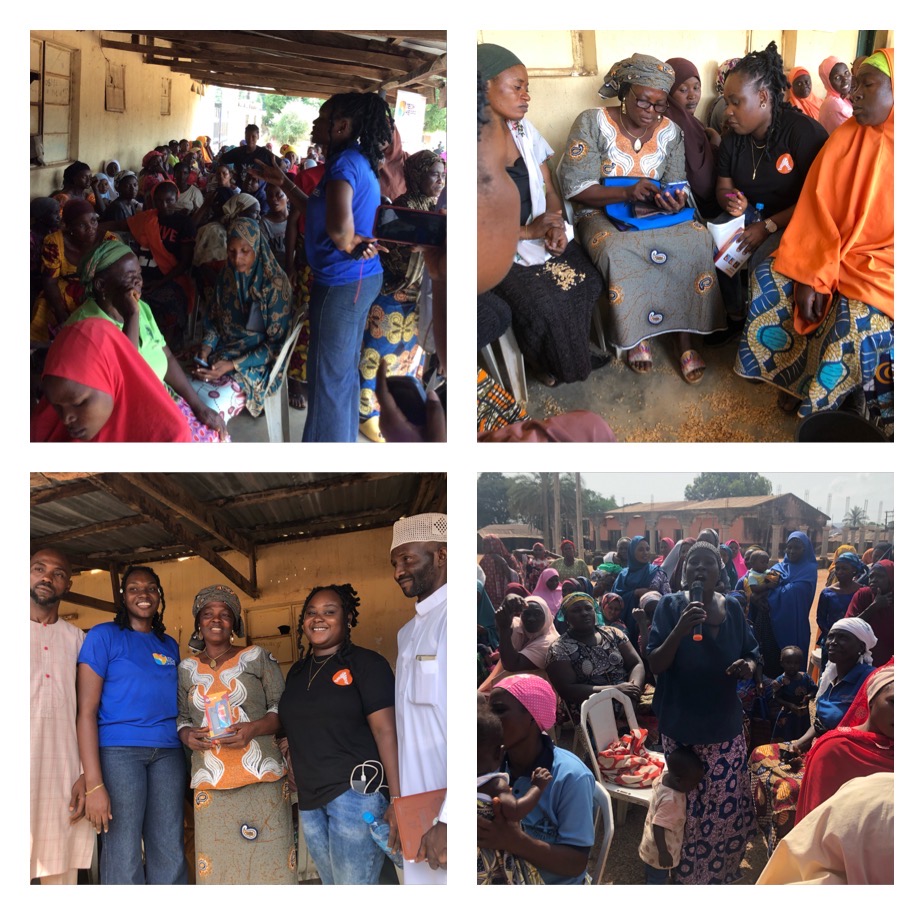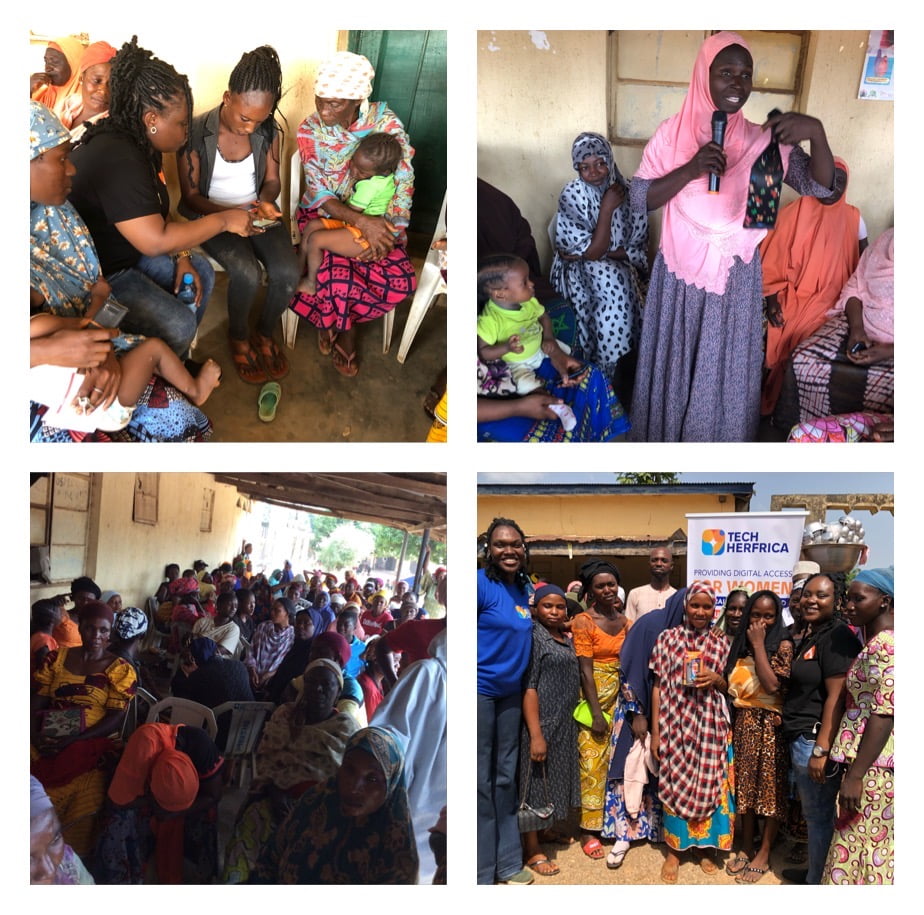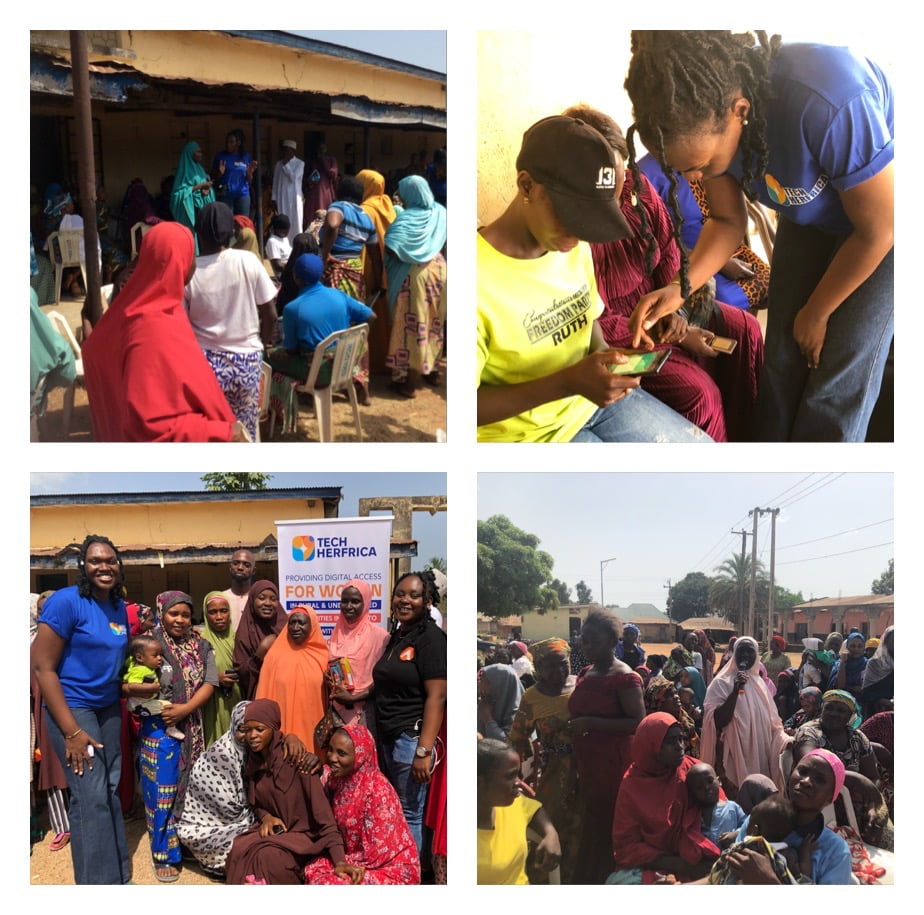Advancing Rural Economy Through Digital and Financial Inclusion for Women in Andaha, Nasarawa State
1.0 Project Overview
On November 29, 2023, Tech Herfrica, in collaboration with Amplitude Group, successfully conducted the EquipHer4Growth programme in Andaha community, Nasarawa State. The project, which was initially designed for 100 women, attracted a total of 260 women. This showcased a strong community interest and the zest of the women to acquire knowledge and skills to improve their livelihood.
1.1 Community Engagement
- Beneficiary Profiling: Mr. Yakubu Abdullahi, a community leader, assigned by the District Community Leader, collaborated with Tech Herfrica to profile beneficiaries based on their needs.
- Entry Meeting: Upon arrival of the project team for project implementation, a meeting with the community leader established rapport and communicated project objective of empowering the women of the community through three key milestones of the EquipHer4Growth initiative: digital and financial literacy training, provision of smartphones, and access to new markets, fostering a shared understanding.
- Post-Implementation Meeting: A concluding meeting with the community leader highlighted achievements of the project after its successful completion, expressed gratitude to the District Community Leader, and reinforced collaboration between Tech Herfrica and the Andaha community.
2.0 Pre-Training Assessment
A comprehensive pre-assessment session uncovered key insights into the community’s existing knowledge and needs:
- SmartPhone Ownership: Only 14.62% of the women (38) possessed smartphones.
- Banking: 50.77% had bank accounts, while 49.23% did not.
- Digital Identity: 72.3% had National Identification Numbers (NIN). Women who did not have stated for various reasons, including their inability to access registration points.
- E-commerce Awareness: None of the participants were familiar with e-commerce.
- Digital Skills: Limited awareness and usage of essential digital tools.
- Health Insurance: 42.69% of the women had heard about health insurance.
- Micro Pension: Less than 5% knew about micro pension plans or the need for long-term savings.
3.0 Training Session
The training session, conducted in Pidgin and Hausa languages, aimed at enhancing participants’ motivation, knowledge, and skills to leverage technology for economic empowerment and to build resilience against some of the impact of climate change. The content covered opportunities in the digital economy (e-commerce, fintech and Agri-tech). Key concepts included digital and financial literacy, online safety, access to new markets, financial services, and farming information. Participants were provided with smartphones to translate their newfound knowledge into practical action. The components of the training were as follows:
3.1 Digital Literacy
3.1.1 Introduction to Digital Economy and E-Commerce
The participants were introduced to the vast opportunities offered by leveraging technology and how to participate in the digital economy. Concepts of e-commerce were explained, emphasizing its potential to transform their business and farming outputs and mitigate the effects of climate change.
3.1.2 Meaningful Use of Digital Devices for Business and Farming Activities
Practical demonstrations were conducted on how to maximize the use of feature phones for effective communication with customers. This included making calls, sending texts to expand their customer reach, and utilizing other features like radio and calculator, to access information, and calculate business profits. Participants were also guided on the usage of smartphones. This involved hands-on training on taking pictures of business and farm products, uploading them on their WhatsApp status, utilizing the voice note feature on WhatsApp, and creating a Facebook page for the women in the community.
3.1.3 How to Stay Safe Online
Participants were educated on how to stay safe online by safeguarding their personal information. Topics covered included recognizing and avoiding attempts to trick them into giving out personal information, not clicking on unknown links, and being cautious of unsolicited calls or messages claiming issues with their bank accounts, etc.
3.2 Financial Literacy Session
3.2.1 The financial literacy segment focused on imparting crucial knowledge about the importance of savings, maintaining a bank account, possessing a form of identification, and proper bookkeeping. The women were guided on differentiating between business and personal finances and calculating their business profits.
3.2.2 Accessing Financial Services
Practical guidance was provided on accessing essential financial services, such as health insurance and micro pension. The aim was to empower the women with the knowledge and tools needed to secure their financial well-being.




4.0 Project Outcomes
The project yielded significant outcomes:
- Improved Literacy: 92% reported newfound knowledge in digital and financial literacy.
- Motivation: 84.6% expressed increased motivation to leverage technology for growth.
- Trust in Technology: 96.2% felt confident using technology for business and farming activities.
- Desire for Services: 80% expressed a desire for loans, 85% for health insurance, and 75% for micro pension.
- Internet-Enabled Devices: Ten clusters, each consisting of 10 women, were equipped with smartphones.
- Community-Based Learning: Cluster leaders were appointed to facilitate ongoing learning, ensuring sustainable impact within the community.
- Access to New Markets: Women committed to creating a community Facebook group and utilizing WhatsApp for sales.
5.0 Lessons Learned
Due to the location of the training, women who were not invited came into the venue to learn. Despite only planning to accommodate 100 women, we successfully accommodated all 260 women in attendance, ensuring the comprehensive training of the entire group. However, it’s worth noting that only the initially planned clusters of 10, consisting of 10 women each, were provided with internet-enabled devices.
6.0 Sustainability
6.1 Community-Based Project Incorporation
The project was formally adopted as a community-based initiative in order to have a long-lasting presence and promote community ownership. This integration serves to support the notion that the project is community-driven, which helps to foster sustainability.
6.2 Empowering Cluster Leaders
Giving cluster leaders the authority to act as community change agents is essential to the project’s viability. These leaders have received training and have been given the responsibility of continuing to empower women in their respective clusters through e-commerce and ongoing digital training. They act as a link between the community and the initiative, promoting ongoing education, support, and information sharing. By entrusting cluster leaders with the responsibility of nurturing ongoing support, the project fosters a culture of self-reliance and ensures the dissemination of knowledge and skills to a broader audience. This approach contributes to the sustained growth and development of the community.
6.3 Creation of WhatsApp Group
In order to facilitate communication between Tech Herfrica and the community, cluster leaders are encouraged to set up WhatsApp groups.
7.0 Conclusion
The training was a resounding success, impacting all participants positively. Tech Herfrica expresses gratitude to Amplitude Group for their collaboration.

